| Srl | Item |
| 1 |
ID:
180531
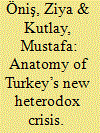

|
|
|
|
|
| Summary/Abstract |
A decade after the global financial turmoil, a new wave of crises is haunting the global South. This pattern is different from previous crisis episodes. Powerful shifts in the international order provide new policy space for emerging powers to manage their economic problems in a heterodox fashion. Key Western-led institutions no longer enjoy a monopoly in dictating the terms of financial assistance for countries in economic difficulty, as non-Western powers increasingly challenge the orthodox Washington Consensus paradigm. The present paper attempts to locate Turkey’s ongoing economic crisis in a comparative-historical context. Its central argument posits that the current crisis is the reflection of a fragile and unconsolidated presidential system and its associated mode of economic governance with state capitalist features. Turkey’s heterodox crisis allows us to draw attention to the complex interplay of global power transitions in a post-liberal international order and domestic political constellations during an era of growing authoritarian populism, generating a new equilibrium with rather unique features.
|
|
|
|
|
|
|
|
|
|
|
|
|
|
|
|
| 2 |
ID:
172240
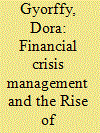

|
|
|
|
|
| Summary/Abstract |
Within the context of the debates on the worldwide rise of populism, this article aims to uncover factors that may reduce the vulnerability of a system to populist challenges. Based on existing theories, Hungary, Latvia and Romania are all susceptible to populism but authoritarian populism has emerged only in Hungary. This puzzle is addressed through examining the process of financial crisis management in the three cases and its impact on the political system. Comparative analysis shows that paternalistic expectations of the state and the government’s willingness to accept Russian support distinguish Hungary from Latvia and Romania.
|
|
|
|
|
|
|
|
|
|
|
|
|
|
|
|
| 3 |
ID:
184472
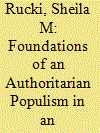

|
|
|
|
|
| Summary/Abstract |
The rise of populism, and its subsequent challenge to liberal democratic institutions, is an ongoing feature of twenty-first century global politics. The author contends that providing college students with theoretical tools to untangle the relationship between the logic and practices of domestic populist political movements and liberal democratic institutions empowers them to analyze critically those challenges and consider the extent to which populism is indicative of prior institutional failure. The work of Antonio Gramsci and Ernesto Laclau are used to develop a model of populism appropriate for advanced undergraduate international relations students. The cases of the Tea Party, Donald Trump’s 2016 presidential campaign, Victor Orbán’s rise in Hungary demonstrate the dynamics of the model and its relevance to the study of international relations and foreign policy.
|
|
|
|
|
|
|
|
|
|
|
|
|
|
|
|
| 4 |
ID:
171955
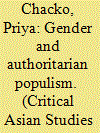

|
|
|
|
|
| Summary/Abstract |
The promotion of conservative gender values has been a feature of the rise of authoritarian populism globally. This paper argues that India’s ruling Bharatiya Janata Party (BJP) uses populist strategies to promote a political project of marketized Hindutva, which melds neoliberalism and Hindu nationalism and appeals to men and women in distinctive ways. This reflects the gendered nature of neoliberalism, electoral imperatives and the patriarchal gender values of Hindu nationalism. Using populist discursive and mobilizational strategies, the BJP aims to suture together a broad social base, represented as “the people,” through the creation of an aspirational identity. Concurrently, it stokes resentment against establishment elites and religious minorities for holding back the people’s aspirations. This politics of resentful aspiration underpins an empowerment agenda of marketized social policies targeted at turning poor and lower-middle class women into virtuous market citizens who embody neoliberal rationalities and Hindu nationalist social values. It also drives a protection agenda mobilizing young, lower-middle class men and the strong arm of the state to protect women’s capacity to become virtuous market citizens. These agendas claim to empower and protect women but are deeply disempowering for the women and men they target and contain inherent contradictions.
|
|
|
|
|
|
|
|
|
|
|
|
|
|
|
|
| 5 |
ID:
141690
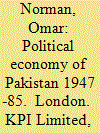

|
|
|
|
|
| Publication |
London, KPI Limited, 1988.
|
| Description |
xiii, 218p.hbk
|
| Standard Number |
0710302118
|
|
|
|
|
|
|
|
|
|
|
|
Copies: C:1/I:0,R:0,Q:0
Circulation
| Accession# | Call# | Current Location | Status | Policy | Location |
| 029357 | 954.9105/NOM 029357 | Main | On Shelf | General | |
|
|
|
|
| 6 |
ID:
151994
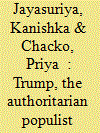

|
|
|
|
|
| Summary/Abstract |
In this short article, the authors analyse the implications of the election of Donald Trump for the future of the liberal rules-based order, with specific emphasis on its implications for the Asian region. Departing from the institutional fetishism that figures prominently in the literature, the authors argue that this liberal order needs to be conceptualised in terms of its social foundations. Particularly important to consider, in terms of understanding these social foundations, is the nature of social relations in the USA. The election of Trump reflects the deep crisis of the US state and the rise of a new ‘authoritarian populism’. The authors trace the roots of this authoritarian populism to patterns of global capitalist transformation, the crisis of the US state and the modes of crisis management that this has generated. They then explore the implications of Trump’s authoritarian populism for the region.
|
|
|
|
|
|
|
|
|
|
|
|
|
|
|
|